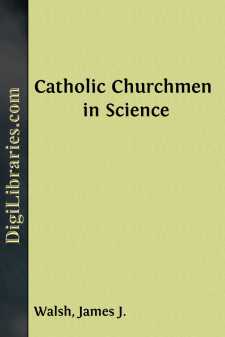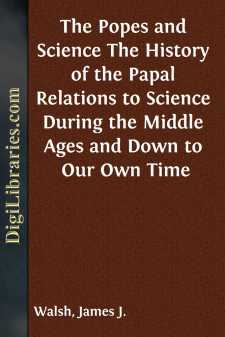Categories
- Antiques & Collectibles 13
- Architecture 36
- Art 48
- Bibles 22
- Biography & Autobiography 813
- Body, Mind & Spirit 142
- Business & Economics 28
- Children's Books 16
- Children's Fiction 13
- Computers 4
- Cooking 94
- Crafts & Hobbies 4
- Drama 346
- Education 46
- Family & Relationships 57
- Fiction 11829
- Games 19
- Gardening 17
- Health & Fitness 34
- History 1377
- House & Home 1
- Humor 147
- Juvenile Fiction 1873
- Juvenile Nonfiction 202
- Language Arts & Disciplines 88
- Law 16
- Literary Collections 686
- Literary Criticism 179
- Mathematics 13
- Medical 41
- Music 40
- Nature 179
- Non-Classifiable 1768
- Performing Arts 7
- Periodicals 1453
- Philosophy 64
- Photography 2
- Poetry 896
- Political Science 203
- Psychology 42
- Reference 154
- Religion 513
- Science 126
- Self-Help 84
- Social Science 81
- Sports & Recreation 34
- Study Aids 3
- Technology & Engineering 59
- Transportation 23
- Travel 463
- True Crime 29
Catholic Churchmen in Science
by: James J. Walsh
Description:
Excerpt
I.
THE SUPPOSED OPPOSITION OF SCIENCE AND RELIGION.
A common impression prevails that there is serious, if not invincible, opposition between science and religion. This persuasion has been minimized to a great degree in recent years, and yet sufficient of it remains to make a great many people think that, if there is not entire incompatibility between science and religion, there is at least such a diversity of purposes and aims in these two great realms of human thought that those who cultivate one field are not able to appreciate the labors of those who occupy themselves in the other. Indeed, it is usually accepted as a truth that to follow science with assiduity is practically sure to lead to unorthodoxy in religion. This is supposed to be especially true if the acquisition of scientific knowledge is pursued along lines that involve original research and new investigation. Somehow, it is thought that any one who has a mind free enough from the influence of prejudice and tradition to become an original thinker or investigator, is inevitably prone to abandon the old orthodox lines of thought in respect to religion.
Like a good many other convictions and persuasions that exist more or less as {4} commonplaces in the subconscious intellects of a great many people, this is not true. Our American humorist said that it is not so much the ignorance of mankind that makes him ridiculous as the knowing so many things "that ain't so." The supposed opposition between science and religion is precisely an apposite type of one of the things "that ain't so." It is so firmly fixed as a rule, however, that many people have accepted it without being quite conscious of the fact that it exists as one of the elements influencing many of their judgments--a very important factor in their apperception.
Now, it so happens that a number of prominent original investigators in modern science were not only thoroughly orthodox in their religious beliefs, but were even faithful clergymen and guiding spirits for others in the path of Christianity. The names of those who are included in the present volume is the best proof of this. The series of sketches was written at various times, and yet there was a central thought guiding the selection of the various scientific workers. Most of them lived at about the time when, according to an unfortunate tradition that has been very generally accepted, the Church dominated human thinking so tyrannously as practically to preclude all notion of original investigation in any line of thought, but especially in matters relating to physical science. Most of the men whose lives are sketched lived during the fifteenth, sixteenth, and first half of the {5} seventeenth centuries. All of them were Catholic clergymen of high standing, and none of them suffered anything like persecution for his opinions; all remained faithful adherents of the Church through long lives.
It is hoped that this volume, without being in any sense controversial, may tend to throw light on many points that have been the subject of controversy; and by showing how absolutely free these great clergymen-scientists were to pursue their investigations in science, it may serve to demonstrate how utterly unfounded is the prejudice that would declare that the ecclesiastical authorities of these particular centuries were united in their opposition to scientific advance....



